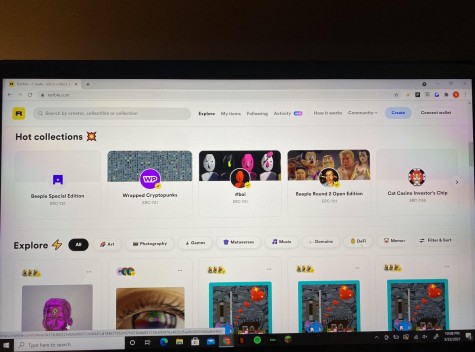Scams involving questionable new cryptocurrencies are becoming increasingly egregious, abundant and shameless, profiting off of the lucrative image associated with well-known coins like Bitcoin and Ethereum.
Bitcoin’s rise to the mainstream has been well-documented by mainstream media. Its ballooning value (about $59,000 at the time of publication) and $1 trillion plus market cap are well known to the public, as well as Ecuador which accepted it as legal tender.
Ethereum, the second largest cryptocurrency, is famous for its use among NFTs, which have attracted A-List celebrities from Lil Baby to Stephen Curry. In fact, as part of Post Malone’s latest music video, he was reportedly paid 175 Ether (worth roughly $750,000 at the time of publication) for a roughly six second shot of him using a service called MoonPay to purchase a Bored Ape Yacht Club NFT.
However, while Etherum and Bitcoin enjoy relative stability and are embraced in high regard by the general public, there are thousands of smaller coins that do not receive nearly the same attention.
Unfortunately, many of these smaller cryptocurrencies moonlighting as legitimate business opportunities are outright scams – modern-day ponzi schemes designed to deceive investors while lining founders’ pockets. These scams operate on a model of attracting great interest for a new coin and guaranteeing large returns for investing in it. Once the coin has reached a certain price, the team behind the coin will commit a “rug-pull” where they instantly sell off their shares in the coin (now at a hyper-inflated price), making the coin defunct and crashing its value. This leaves the cheated investors with a worthless investment, despite the money they poured into it.
These scams often gain a sense of legitimacy by acquiring a celebrity endorsement or associating themselves with popular culture. A classic example is the Squid Game token, named after the hit Netflix series. Although the cryptocurrency had no official ties to the Netflix show, it used the Korean drama’s immense buzz to propel itself to be worth several hundred dollars per coin at its peak. However, upon reaching its all-time high value, an instant rug-pull occurred, dropping the value of the coin to less than one cent after an hour.
While investors in the Squid Game token were left penniless, the team behind it reportedly made over $3.3 million after the rug-pull. Due to the natural anonymity of cryptocurrencies and clever disguising techniques, it is highly unlikely that the Squid Game token team will ever be found or face any consequences.
Celebrities have also faced serious backlash for promoting emerging cryptocurrencies with unclear origins, often in exchange for a fee or partnership. Rapper Soulja Boy was ridiculed in May for accidentally including in a promotional tweet that he would get paid $24,000 if SaferMoon, a scam coin, reached a certain price. However, since May, SaferMoon has apparently disappeared from the Internet, signaling a clear rug-pull.
Socialite Kim Kardashian promoted EthereumMax to her 200 million followers via an Instagram story in June. EthereumMax has no relation to Ethereum and is likely a scam coin as well, with a huge spike and subsequent plummet in value after Kardashian’s story. Influencer Adin Ross, actress Paris Hilton, rapper Lil Pump and several more celebrities have all come under fire for endorsing brand-new, questionable cryptocurrencies to their millions of followers.
Senior Kevin Lie-Atjam is an avid crypto-enthusiast, following Bitcoin since 2017. He is highly critical of the influx of cryptocurrency scams. “It’s been really disappointing to see people lose money as they expect their investments to ‘go to the moon’ since these currencies are often advertised as a high reward investment with little risk,” he said. “People feel pressured to invest into these currencies because of a new trend or an influencer they look up to is also investing in these tokens such as SaveTheKids token or most recently the Squid Game token.”
The blatant scam coins detract from the remarkable qualities that cryptocurrencies do hold. Their anonymity makes it harder for users to have their purchases tracked, and cryptocurrencies are decentralized, meaning they are not controlled and affected by the politics of a specific country. However, with any promising, revolutionary new technology, there will be those trying to take advantage of hopeful but inexperienced early adopters.This effect is magnified by a slow moving US government that has failed to create adequate rules and regulations on this elusive technology.
These cryptocurrency rug-pulls are nothing more than pyramid schemes adopted for young, eager and tech-savvy people. At the top of the pyramid are the founders and owners of a new coin. In the middle are the influencers recruited to gather interest. At the bottom is the average investor, who receives nothing when the owners decide to abandon the operation.
Sophomore Achinteya Jayaram is involved in the world of cryptocurrencies, buying a mining rig to generate his own Ethereum. He believes in the future of cryptocurrencies but acknowledges the danger that comes with them. “Crypto is a fascinating platform and there are endless possibilities to do almost anything, but that comes with major risks as well, whether that’s losing money legitimately or not,” he explained.
It is understandable why Gen-Z and young millennials are drawn to the allure of crypto: There are plenty of success stories. Who can forget the overnight millionaires created by the hype around Dogecoin, Gamestop and AMC? Seeing the success of these investment miracles, it makes sense that people would want desperately to latch onto the next big thing.
Unfortunately, it appears young people are placing the promise of quick, easy money above common sense.



















Sydney Dolphin • Dec 4, 2021 at 2:29 pm
I also think cryptocurrency is a really cool idea right now, but there are so many misconceptions going around with it. People are learning the wrong things about it and are almost influenced to invest in this cryptocurrency because of the internet. I would agree with what Kevin said about how many people are getting pressured into these currencies because of social media.
Ryan Thoreson • Nov 30, 2021 at 11:15 am
I think cryptocurrency is a fascinating subject, but it is unfortunate that in an environment like the cryptocurrency world, people are still working to take advantage of others by creating a fake product. It feels very similar to scam emails, but instead of hacking into technology, people are just scamming uninformed consumers right out of any money and profiting off of their vulnerability.